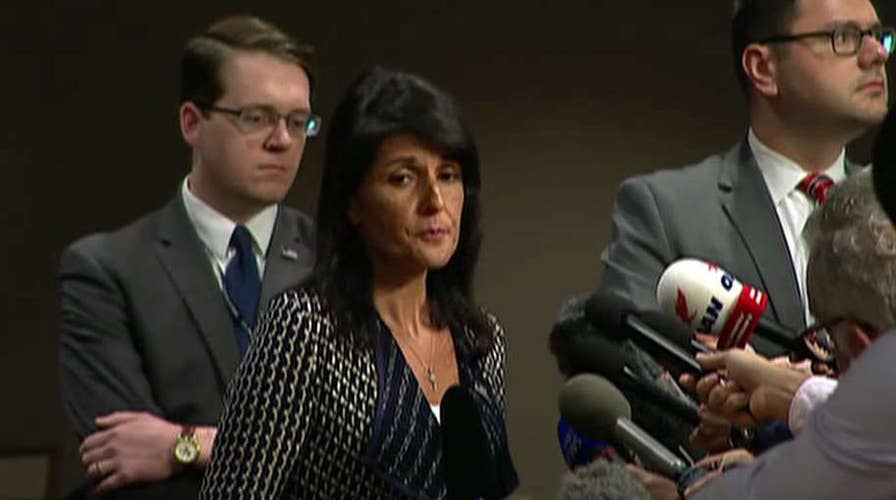Eric Shawn reports: UN security meets on North Korea launch
Amb. Nikki Haley calls for new sanctions saying 'Enough is enough'
Japan’s United Nations ambassador told reporters today that a new U.S.-backed resolution could be in the works to further isolate North Korea, following a resounding Security Council condemnation last night of North Korea’s latest missile launch over Japan.
Earlier this week, U.S. Ambassador to the U.N. Nikki Haley, along with her Japanese counterpart, had called for an emergency meeting of the Security Council to condemn North Korea for its firing of a missile over Japan earlier this week.
The result was a unanimous condemnation of North Korea’s missile launch and demands for it to obey Security Council resolutions in the form of a Presidential Statement that was passed last night.
“The world is united against North Korea. There is no doubt about that it is time to recognize the danger they are putting themselves in,” Haley told the Security Council late last night.
“The U.S. will not allow their lawlessness to continue and the rest of the world is with us,” she said.
Haley’s attempt to get a quick condemnation through the Security Council was praised by one Security Council diplomat who said it was “a bold throw of the dice by Nikki Haley to try and get it agreed, and succeeded in getting it agreed.”
A spokesperson from the U.S. Mission to the United Nations told Fox News that the United States is not currently working on a new resolution on North Korea, but Japan’s U.N. ambassador Koro Bessho seemed to suggest new solutions were in the works.
“I think that’s my understanding, but you’d have to ask her about it,” he told reporters when asked if the U.S. was going to go ahead and work on a new resolution.
The U.S. is usually the penholder for North Korea resolutions and would be expected to negotiate with China and other members of the Security Council if there was a new resolution.
Bessho said he would discuss any new ideas for sanctions with the U.S.
“As far as the drafting itself is concerned, of course the penholder is the United States, but we would obviously like to discuss it with the United States, we’d like to give some ideas, if we have any new ideas,” he said.
The latest of seven sanction-specific resolutions on North Korea was passed earlier this month and targeted some of the most profitable sectors of Pyongyang’s economy.
The U.S.-sponsored resolution was supported by all 15 members of the Security Council and sanctioned the Hermit Kingdom’s coal, iron, iron ore, lead, lead ore, seafood and capped the number of foreign laborers.
Experts estimate the new sectors being sanctioned would cost the North Korean economy $1 billion out of the $3 billion it gets annually from its exports for the aforementioned sectors.
“We think that the time is right to consider further constraints on the DPRK regime, given that the constraints that we have put in place, so far, have clearly not yet got them to change course,” Britain’s U.N. Ambassador Matthew Rycroft told reporters.
Rycroft said one area would be to build upon the cap on foreign laborers, saying: “We could do more to prevent the flow of money coming into the DPRK from North Korean nationals who are working abroad.”
Experts are worried that North Korea could be getting ready for another nuclear weapons test in early September when it celebrates its founding on September 9.

